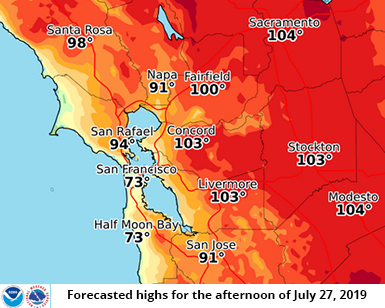San Rafael, CA – The National Weather Service (NWS) has issued an Excessive Heat Watch for the Bay Area. While Marin County is not included in this Watch, NWS has identified areas of moderate heat risk in San Rafael, Novato, Fairfax, Kentfield and Larkspur.
 The National Weather Service has forecasted extreme high temperatures for parts of Northern California, with several Marin communities facing moderate heat risk.
The National Weather Service has forecasted extreme high temperatures for parts of Northern California, with several Marin communities facing moderate heat risk. As temperatures continue to rise with climate change, officials expect to see more severe weather events, including poor air quality days and an increase in Red Flag Warnings. These conditions also increase the probability of Public Safety Power Shutoffs (PSPS).
Heat affects everyone differently. Extremely high or unusually hot temperatures can affect a person’s health, especially when outdoors for long periods of time. Those most vulnerable to extreme heat include older adults, people with chronic medical conditions or mental health conditions and the socially isolated.
“Marin County residents living in affected areas should find relief from high outdoor temperatures,” says Dr. Lisa Santora, the County’s Deputy Public Health Officer. “We urge people to be aware of the symptoms of heat-related illnesses and to take common sense measures to stay cool and healthy during extreme temperatures."
During this heat wave, residents should take the necessary precautions to prevent serious health effects for heat-related illnesses. Marin Health and Human Services suggests the following tips to stay cool and safe, including:
STAYING COOL
- Do not leave children and pets unattended in vehicles
- Limit outdoor activities
- Stay in air-conditioned buildings and shelters, including the mall, library or public cooling center
- Wear loose, lightweight, light-colored clothing
- Check on friends, family and neighbors who are sensitive to heat at least twice a day.
STAY HYDRATED
- Drink more water than usual
- Drink two to four cups of water every hour while working or exercising outside
- Avoid alcohol or drinks containing high amounts of sugar
- Make sure family, friends and neighbors drink enough water
STAY INFORMED
- Check local news for extreme heat warnings and safety tips
- Keep friends, family and neighbors aware of weather and heat safety information
- Recognize the signs of a heat illness (below) and if symptoms are severe or life threatening, call 911
Know the signs of heat-related illnesses
Heat-related illness is a spectrum of disorders due to environmental factors, specifically heat exposure. Symptoms can be minor from heat rash, cramps, headache and fatigue, to more severe and even life-threatening conditions like heat exhaustion and heat stroke.
SYMPTOMS OF HEAT EXHAUSTION
- Weakness
- Skin is cold, pale and clammy
- Weak pulse
- Fainting and vomiting
WHAT TO DO IF EXPERIENCING HEAT EXHAUSTION
- Move to a cooler location
- Lie down and loosen clothing
- Apply cool, wet clothes and cover as much of the body as possible
- Drink plenty of water (avoid caffeine and alcohol)
- If vomiting occurs and is continuous, seek medical attention immediately
SYMPTOMS OF HEAT STROKE
- High body temperature (above 103 degrees F)
- Hot, red, dry or moist skin
- Rapid and strong pulse
- Possible unconsciousness
WHAT TO DO IF EXPERIENCING HEAT STROKE
- Call 911 immediately if symptoms present
- Move the person to a cooler environment
- Reduce the person’s body temperature with cool cloths or even a bath
- Do NOT provide fluids.
Preparation can make a difference in avoiding heat stroke or heat exhaustion. Be familiar with local cooling center locations. Review additional extreme heat preparation tips recommended by the Center for Disease Control and Prevention. Learn more about the Public Safety Power Shutoff Program and how to prepare for extended power outages.